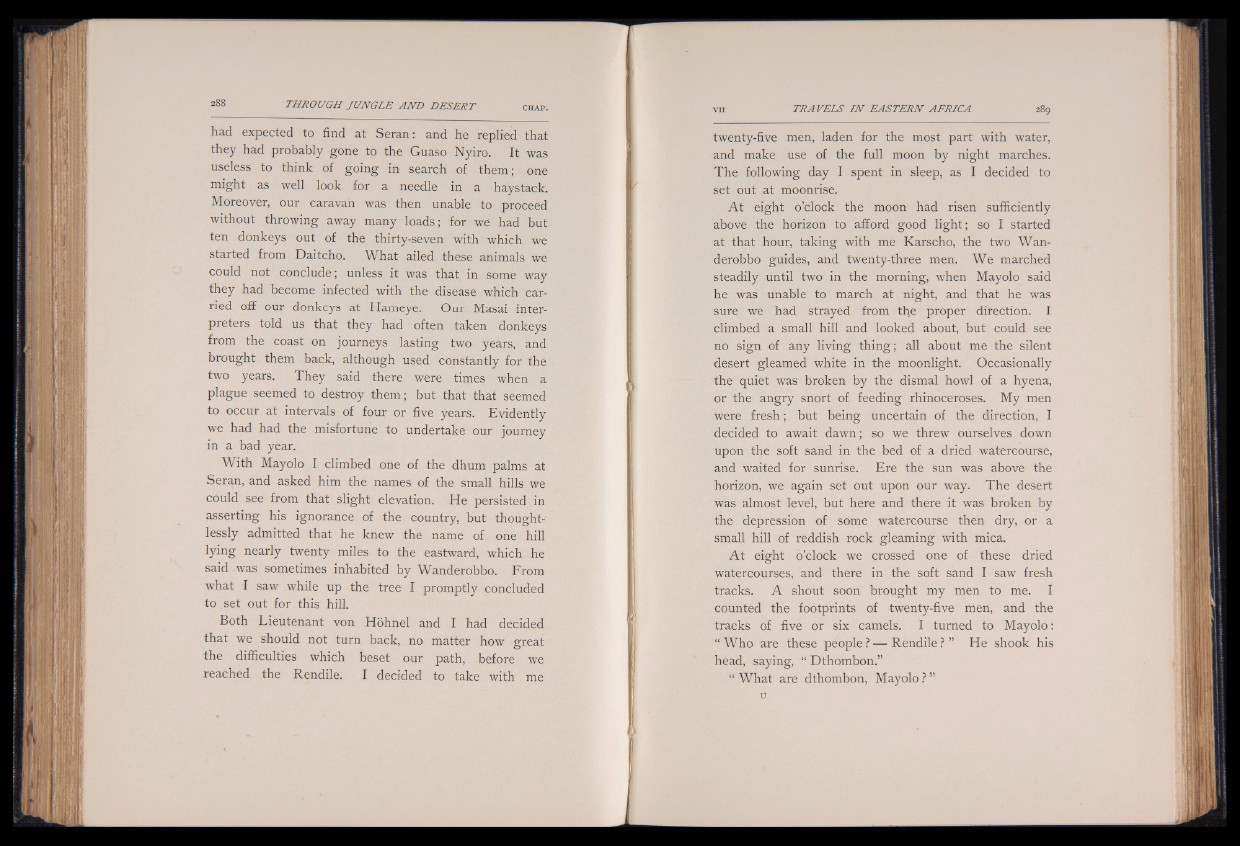
had expected to find at Seran: and he replied that
they had probably gone to the Guaso Nyiro. It was
useless to think of going in search of them; one
might as well look for a needle in a haystack.
Moreover, our caravan was then unable to proceed
without throwing away many loads; for we had but
ten donkeys out of the thirty-seven with which we
started from Daitcho. What ailed these animals we
could not conclude; unless it was that in some way
they had become infected with the disease which carried
off our donkeys at Hameye. Our Masai interpreters
told us that they had often taken donkeys
from the coast on journeys lasting two years, and
brought them back, although used constantly for the
two years. They said there were times when a
plague seemed to destroy them; but that that seemed
to occur at intervals of four or five years. Evidently
we had had the misfortune to undertake our journey
in a bad year.
With Mayolo I climbed one of the dhum palms at
Seran, and asked him the names of the small hills we
could see from that slight elevation. He persisted in
asserting his ignorance of the country, but thoughtlessly
admitted that he knew the name of one hill
lying nearly twenty miles to the eastward, which he
said was sometimes inhabited by Wanderobbo. From
what I saw while up the tree I promptly concluded
to set out for this hill.
Both Lieutenant von Höhne! and I had decided
that we should not turn back, no matter how great
the difficulties which beset our path, before we
reached the Rendile. I decided to take with me
twenty-five men, laden for the most part with water,
and make use of the full moon by night marches.
The following day I spent in sleep, as I decided to
set out at moonrise.
A t eight o’clock the moon had risen sufficiently
above the horizon to afford good light; so I started
at that hour, taking with me Karscho, the two Wanderobbo
guides, and twenty-three men. We marched
steadily until two in the morning, when Mayolo said
he was unable to march at night, and that he was
sure we had strayed from the proper direction. I
climbed a small hill and looked about, but could see
no sign of any living thing; all about me the silent
desert gleamed white in the moonlight. Occasionally
the quiet was broken by the dismal howl of a hyena,
or the angry snort of feeding rhinoceroses. My men
were fresh; but being uncertain of the direction, I
decided to await dawn; so we threw ourselves down
upon the soft sand in the bed of a dried watercourse,
and waited for sunrise. Ere the sun was above the
horizon, we again set out upon our way. The desert
was almost level, but here and there it was broken by
the depression of some watercourse then dry, or a
small hill of reddish rock gleaming with mica.
A t eight o’clock we crossed one of these dried
watercourses, and there in the soft sand I saw fresh
tracks. A shout soon brought my men to me. I
counted the footprints of twenty-five men, and the
tracks of five or six camels. I turned to Mayolo:
“ Who are these people ? — Rendile ? ” He shook his
head, saying, “ Dthombon.”
“ What are dthombon, Mayolo ? ”
u